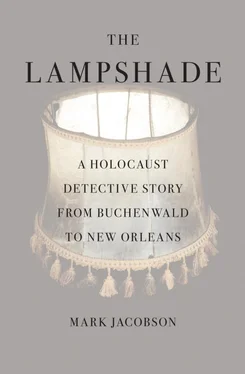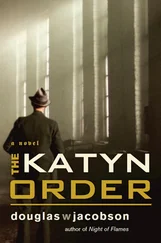A human skin lampshade for thirty-five dollars. That was a deal, all right.
• • •
Dave Dominici’s claim about the provenance of the lampshade was unsettling, not that Skip believed it. New Orleans was full of wacky people with scary, implausible stories, more every day since the hurricane. But just because your worst nightmares were coming true on a regular basis was no reason to believe everything you heard. Was there any reason to believe anything Dave Dominici said? The man was seemingly not stable, a potential substance abuser of the first order. That very day, Dominici revealed that, along with his girlfriend, the thin and pale Gaynielle— Gaynielle Dupree, was that New Orleans enough for you? —he had slept right through Katrina.
“Out like a light. Dead to the world,” he said, matter-of-factly. They didn’t even wake up when the storm winds tipped his house on its foundation, leaving spidery cracks in the plaster walls. The next morning Dominici was puzzled to find himself walking uphill to get to the bathroom, as if he’d been transported to an antigravity room in a funhouse. It was only when he looked out the shattered window to see the uprooted trees and overturned cars that it occurred to him to inquire, “What the hell happened here?”
Dave Dominici was a character, all right, a true New Orleanian gone cat. As Skip was walking away with the lampshade, Dominici called after him. Did Skip want to buy some “house columns”? Two eight-foot wooden faux-Doric columns had held up the roof of the small porch in front of Dominici’s house. One had been knocked down during the storm and lay in the yard. The other was in place. “ Neighbor! Fifty for the pair,” Dominici shouted, tugging at the still-standing column as Skip walked away.
Skip didn’t believe it. Not at first. Still, even if he once had sold the skeleton of a human hand to one of his guitar shop clients, rock and roller Willy DeVille, Skip wasn’t about to argue when his wife, the lovely Fontaine, told him there was “absolutely no way that thing” was going on any lamp in her house. Not with that story attached to it.
Skip could have thrown the lampshade out at that point, as much as it was preying on his mind, sending out those bad vibrations, real or imagined. He meant to throw it out. But he didn’t. He let it sit there, in his closet, festering.
Once, during his “school pig” days in northern New Jersey, Skip was handed the case of a nine-year-old girl named Jessica. She hadn’t shown up at school for a week and there was no answer at her home. Skip went out to the house to find out why. When he got there he found the house had been burned down ten days before. It was a crime scene. Someone had torched the place. Jessica and her grandfather were dead, burned alive. As it turned out, the whole thing was a big mistake. A female drug dealer in the area had been ripped off by another dealer, so she gave her crackhead boyfriend a can of gasoline and told him to burn down the rival’s home. He got the wrong house. Jessica’s body was nearly unrecognizable by the time it was recovered. The cops had Skip look through pictures of dozens of burned children, trying to get some kind of identification.
What made people do things like that, Skip often wondered, kill other people out of sheer stupidity and greed? On another truant case he showed up at the kid’s address to find her three-year-old sister lying in a snowbank in her underwear. The mother had thrown her out of the house because she wouldn’t stop crying. Skip wrapped her up in his trench coat and took her to the emergency room. When the doctors finally came to attend the child, Skip just stood there in the hospital hallway screaming.
These things stayed with you. They scarred you. Twenty-five years after the incidents, Skip could remember the names of all the victims, the colors of the rooms they lived in, the way the rugs in their houses seemed to be alive beneath your feet until you realized it was roaches, the bugs in shag carpeting that made it look like it was moving. What made seven-year-olds shoot other seven-year-olds in the face at the Iberville projects? Sociology was one thing, evil another. Evil was a magnetic force, Skip thought. It was as ubiquitous as the broken glass beneath your feet, the stale air you breathed. This was what priests had taught him, and Skip saw no reason to stop believing it now.
One morning, after a restless sleep, Skip packed up the lampshade and sent it to a drum maker he knew, a person with a taste for the macabre. A few days later the lampshade came back. “I’ve been beating on skins my whole life,” the drum maker told Skip, “and I never saw anything like this. The animal that came from never had any fur on it.”
A few days later Skip packed the lampshade up again and sent it to a pathologist he’d known for years. Once more the lampshade came back. “Don’t send me shit like that,” the pathologist said.
It was around then that I happened to call Skip. We’d gotten closer over the years, especially since I’d joined the Bywater Bone Boys and spent Mardi Gras morning making as much noise as possible, waking the “predeceased.” Skip told me about the lampshade, the whole saga more or less.
“That’s a weird story, Skip,” I said.
“Well,” Skip replied, “it isn’t my problem anymore.”
“How’s that?”
“Because I just sent it to you . You’re the journalist, you figure out what it is.”
A few days later a box arrived at my door in Brooklyn. It came U.S. mail, covered with forty or so first-class stamps bearing the likeness of the great boxer Sugar Ray Robinson. Sugar Ray was Skip’s way of saying he was sorry for sending the thing. He knew Ray was my all-time favorite, the way he moved. Like that was supposed to soften the blow. I opened the box and looked inside.
“Gevalt,” I said.

THREE

Half a century before Skip Henderson’s package arrived at my door, before the word holocaust was spelled with a capital H, my subteen friends and I, growing up in the “fresh air zone” of Flushing, Queens, knew the lampshade was a bad thing, not that any of us thought about it very much. Beloved child actors in the then fully functioning American Dream theater, we rode our bikes and bounced our Spaldeens in our own personal Utopia. If anyone said it wasn’t so, we had Utopia Parkway, a nice six-lane road with its own exit off Robert Moses’s (our Albert Speer) newly constructed Long Island Expressway to prove it. Just about everyone’s dad worked for what civil servants always called “the City of New York,” got his house on the GI Bill, and made the same amount of money. It was probably as close to socialism as there ever was in the United States, not that we Cold War kids, who one day gathered by the expressway to boo as Khrushchev’s car drove by, were supposed to know anything about that.
The Italians were the tough guys, of course. Mostly they were okay, but there were those times when you’d hear that ominous chorus of fake sneezing. “Ah-ah-ah… Jew! ” And there’d they be—Vito, Joey, and Willie, the Romanos, the Littelis—bouncy in their continental pants, hairless chests thrust out, waiting to see what you’d do.
There were two choices. You could ignore them, hope they found someone else to hassle. Or you could reply, as I sometimes did, “ Guinea -sundheit.” Screaming and yelling followed, maybe some pushing. Sometimes the conflict would escalate. Then it would come out: “Shut your fucking mouth or I’ll turn you into a lampshade. You heard me, Jewboy. A lampshade .”
Читать дальше













